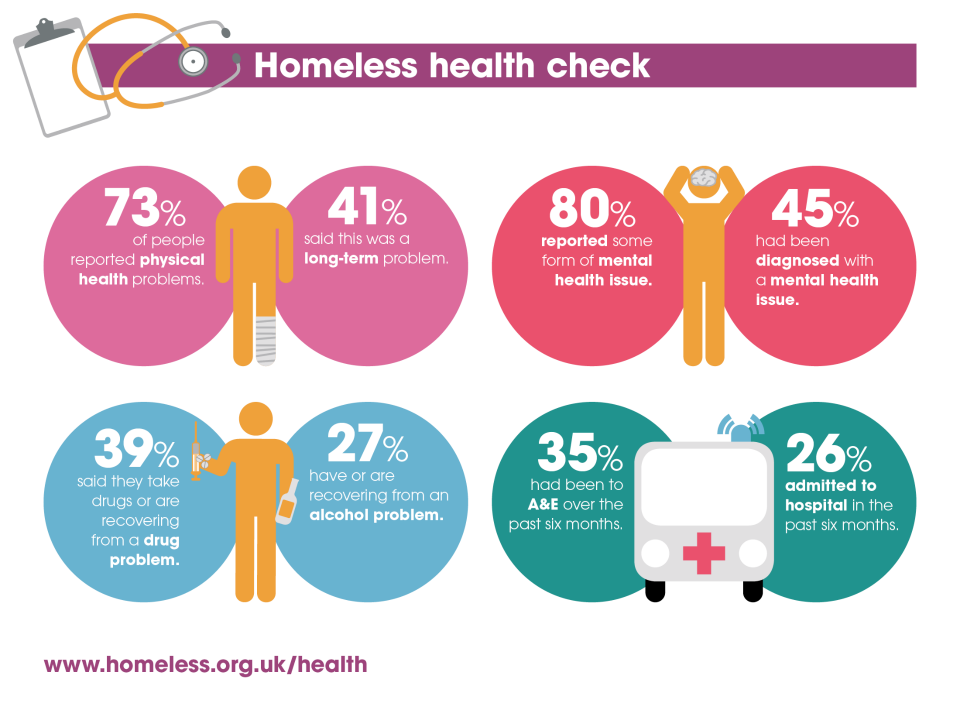
The definition of health has changed greatly over the last century. While ideas of health used to define only biological illnesses or disorders, today the World Health Organization defines health as “a state of complete physical, mental and social well-being and not merely the absence of disease or infirmity.” The infographic above, published in the United Kingdom by Homeless Link, provides the reader with a brief snapshot of the health problems suffered by homeless populations with the modern definition of health in mind; a definition that goes far beyond an individual’s physical health to include mental health and lifestyle factors.
The percentages in the infographic tell a story. 80% reported struggling with some form of mental health issue. 73% of those surveyed reported physical health problems. 39% take drugs or are in the process of recovering from a drug problem. These are all alarming figures. However, comparing figures between the homeless population and the general population provides us with proof of the incredible discrepancy that exists between both groups. Compared to the general population, health issues are experienced at much higher levels by homeless people. This discrepancy is most striking when considering the drug consumption - in the UK homeless people are 7 times more likely to have used drugs in the past month compared to the general population. Factors contributing to increased drug use among homeless populations include pre-existing mental health issues, alcoholism, and lack of access to healthcare.
There are barriers across all the stages of the healthcare delivery process when Canadians who are homeless try to receive treatment. Difficulties arise even before a homeless person enters a clinic. Patients usually have to place an appointment prior to a consultation, and those affected by homelessness are unlikely to have a phone or a permanent address. Even once when being treated, homeless individuals may receive a diminished quality of care because of how a healthcare service provider judges their situation. Gaps in healthcare provision can also end up causing financial worries, as accessing provincial and federal healthcare reimbursements is more difficult to access for homeless people compared to the general population. For example, an individual may not have the necessary documentation to obtain a Canadian health card or provincial healthcare coverage. The 2007 Street Health Report’s findings showed that more than a quarter of those surveyed had been refused healthcare because they didn’t have a health card.
Following a hospital visit, homeless people run into problems when it comes to accessing follow-up healthcare on their condition. In most cities, healthcare provision for homeless people is managed entirely by emergency departments. Both chronic and acute conditions are unlikely to receive treatment under such a delivery model - until they become emergencies. A system in place that only addresses emergency situations is unfit to meet the everyday healthcare needs of Canada’s homeless population. Chronic health conditions that require regular check-ups, mental health issues, and substance abuse are threats to health and well being that are all poorly mitigated under such a model. When we compare the current status of care provided to homeless populations with the WHO’s holistic definition of healthcare, it’s evident that current provisions in place for homeless populations are inadequate.
Accordingly, health outreach for homeless populations is of critical importance when we consider how Canada can provide proper healthcare. In the past, hostel outreach programs for homeless clients with a history of mental illness have shown promise, and have been associated with decreased symptoms and an increase in social functioning. Managed Alcohol Programs, built around a harm reduction approach, have been carried out in cities across Canada, and participants in those programs report reduction in alcohol-related harms and improvements in mental health.
It’s unlikely that there will ever be a simple one-step solution towards achieving health and well-being for populations, homeless or otherwise. However, investing in research and programs directed towards the needs of homeless populations, including filling in the gaps that currently exist in healthcare delivery, surely acts as big step towards reaching that goal. Failure to account for the health needs of homeless populations is likely to perpetuate and further exacerbate existing problems.

